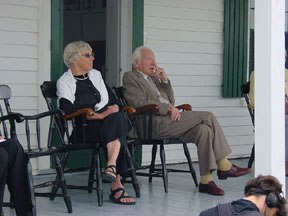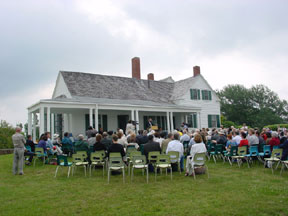Reflections 1957-2003 By Ruth S. Adams
53rd Pugwash Conference on Science and World Affairs Advancing Human Security:
The Role of Technology and Politics
Halifax and Pugwash, Nova Scotia, Canada
17-21 July 2003
Reflections 1957-2003 By Ruth S. Adams
53rd Pugwash Conference on Science and World Affairs Advancing Human Security:
The Role of Technology and Politics
Halifax and Pugwash, Nova Scotia, Canada
17-21 July 2003
Looking back across a lengthy span of 46 years, the 1957 gathering of scientists in Pugwash still stands out for the bold and forward-looking message it carried to the world. We remember most immediately, of course, the international consensus of scientists it enunciated in the substantive area of controlling nuclear weapons. But no less important was the breakthrough in the relationships and depth of communications it embodied, at that time especially among scientists, across not only international borders but social systems, political regimes, and hemispheres.
Globalization today has taken on other meanings as well, some of them controversial, but most fundamentally it refers to the outward spread to all of the world's peoples and to every walk of life, of that original outlook that Pugwash quite breathtakingly embodied. My own opportunity to participate was a result of having worked with Eugene Rabinowitch as assistant editor of the Bulletin of Atomic Scientists.
Born in St. Petersburg, the tumultuous political events of his life brought him to Chicago and the Manhattan Project during World War II. A prolific writer and sensitive analyst of political issues, he made important contributions to the Pugwash movement and attended all of its meetings during his lifetime. Published reports of the discussions and agreements regularly appeared in the Bulletin. I must have been one of the youngest participants at the original gathering. That first meeting was to shape most of the following decades of my life. But along with the many strands of continuity of which I remain deeply conscious, I am no less conscious of the extraordinary array of world changes in which we have sometimes reluctantly, sometimes eagerly, participated. We need to think today as much about the kaleidoscopic changes of context that Pugwash and its membership have endured, adapted to, and tried both to shape and to anticipate, as we reflect on the community we have become and the long list of achievements for which we can take credit.
As a young woman finding her way in the post-World War II period, my path of convergence with the concerns that led to Pugwash focused on human rights that were then, as now are still, under attack. The stifling of discourse and diversity represented by the McCarthy hearings was very much with us then. Peacemaking itself was widely regarded as suspect, under the threatening cloud of a nuclear holocaust that was still recent enough for many of the Cold War calculations accompanying it to come as highly unpleasant surprises. The many scientists and scholars who had come to the University of Chicago as refugees had substantially transformed its character, contributing directly to the establishment not only of the Bulletin of Atomic Scientists but later the Federation of American Scientists. The Iron Curtain that had descended very soon after the war had the effect for some time of imprisoning the values and goals of peoples on both sides.
Then out of correspondence in 1955 came the Russell-Einstein appeal. To those of us in Chicago it was like finding a crack in the Iron Curtain. Especially to me, and to many of those in my generation in that setting, it gave meaning and set a principled direction that we could follow with enthusiasm. It is easy to forget now that war had had the universal effect of concentrating science in government laboratories, on goals and priorities set with essentially no regard for scientific imperatives, and under conditions of secrecy that greatly impeded communication even among immediate colleagues in the same institution. The 'fifties were a time when that force of obstruction was beginning to lift, when educational and scientific institutions were reasserting their independence, when the need for open communication and cooperation on common, great problems across all boundaries once again became apparent. We were a part of that, and very much in the forefront of it
.
The physical sciences were still in their government-imposed ascendancy at the time, but excitement was in the air of coming revolutions in biology. Science in not-for-profit and corporate settings was still largely seen as a different kind of enterprise. But there too, coming change was visible along a distant horizon. These enormous changes are all around us now, parts of Pugwash's intimate environment. I hope we can find ways to embrace them, and at the same time shape them within a framework of consistent principles and values, just as we originally took leadership in finding an international basis for confronting the nuclear peril.
Still taken as a given at our first meeting, as I reflect upon it, was the sovereignty of the nation-states from which we all came, and of a general acceptance of the paramount claims which the regimes in most of those states felt free to make upon our behavior, basic values, and loyalty. Those paramount claims are more contested today than they were then. The UN is no longer in its infancy, even if the limitations of its powers are more apparent than what we then hoped. Today there are many international communities that embody shared values and loyalties. They do not erase national boundaries, but they mitigate and circumscribe their more absolutist meanings. Pugwash is among the very best of these trans-national communities. I look back with gratitude and pride on the decades of my association with it. Some of you here today are members of the third generation since Pugwash began, and in itself your presence is dramatic evidence of the success of the Pugwash conferences. As we reflect on our origins we pay tribute to all the young scientists who continue to work for peace and security.
53rd Pugwash Conference on Science and World Affairs Advancing Human Security:
The Role of Technology and Politics
Halifax and Pugwash, Nova Scotia, Canada
17-21 July 2003
Looking back across a lengthy span of 46 years, the 1957 gathering of scientists in Pugwash still stands out for the bold and forward-looking message it carried to the world. We remember most immediately, of course, the international consensus of scientists it enunciated in the substantive area of controlling nuclear weapons. But no less important was the breakthrough in the relationships and depth of communications it embodied, at that time especially among scientists, across not only international borders but social systems, political regimes, and hemispheres.
Globalization today has taken on other meanings as well, some of them controversial, but most fundamentally it refers to the outward spread to all of the world's peoples and to every walk of life, of that original outlook that Pugwash quite breathtakingly embodied. My own opportunity to participate was a result of having worked with Eugene Rabinowitch as assistant editor of the Bulletin of Atomic Scientists.
Born in St. Petersburg, the tumultuous political events of his life brought him to Chicago and the Manhattan Project during World War II. A prolific writer and sensitive analyst of political issues, he made important contributions to the Pugwash movement and attended all of its meetings during his lifetime. Published reports of the discussions and agreements regularly appeared in the Bulletin. I must have been one of the youngest participants at the original gathering. That first meeting was to shape most of the following decades of my life. But along with the many strands of continuity of which I remain deeply conscious, I am no less conscious of the extraordinary array of world changes in which we have sometimes reluctantly, sometimes eagerly, participated. We need to think today as much about the kaleidoscopic changes of context that Pugwash and its membership have endured, adapted to, and tried both to shape and to anticipate, as we reflect on the community we have become and the long list of achievements for which we can take credit.
As a young woman finding her way in the post-World War II period, my path of convergence with the concerns that led to Pugwash focused on human rights that were then, as now are still, under attack. The stifling of discourse and diversity represented by the McCarthy hearings was very much with us then. Peacemaking itself was widely regarded as suspect, under the threatening cloud of a nuclear holocaust that was still recent enough for many of the Cold War calculations accompanying it to come as highly unpleasant surprises. The many scientists and scholars who had come to the University of Chicago as refugees had substantially transformed its character, contributing directly to the establishment not only of the Bulletin of Atomic Scientists but later the Federation of American Scientists. The Iron Curtain that had descended very soon after the war had the effect for some time of imprisoning the values and goals of peoples on both sides.
Then out of correspondence in 1955 came the Russell-Einstein appeal. To those of us in Chicago it was like finding a crack in the Iron Curtain. Especially to me, and to many of those in my generation in that setting, it gave meaning and set a principled direction that we could follow with enthusiasm. It is easy to forget now that war had had the universal effect of concentrating science in government laboratories, on goals and priorities set with essentially no regard for scientific imperatives, and under conditions of secrecy that greatly impeded communication even among immediate colleagues in the same institution. The 'fifties were a time when that force of obstruction was beginning to lift, when educational and scientific institutions were reasserting their independence, when the need for open communication and cooperation on common, great problems across all boundaries once again became apparent. We were a part of that, and very much in the forefront of it
.
The physical sciences were still in their government-imposed ascendancy at the time, but excitement was in the air of coming revolutions in biology. Science in not-for-profit and corporate settings was still largely seen as a different kind of enterprise. But there too, coming change was visible along a distant horizon. These enormous changes are all around us now, parts of Pugwash's intimate environment. I hope we can find ways to embrace them, and at the same time shape them within a framework of consistent principles and values, just as we originally took leadership in finding an international basis for confronting the nuclear peril.
Still taken as a given at our first meeting, as I reflect upon it, was the sovereignty of the nation-states from which we all came, and of a general acceptance of the paramount claims which the regimes in most of those states felt free to make upon our behavior, basic values, and loyalty. Those paramount claims are more contested today than they were then. The UN is no longer in its infancy, even if the limitations of its powers are more apparent than what we then hoped. Today there are many international communities that embody shared values and loyalties. They do not erase national boundaries, but they mitigate and circumscribe their more absolutist meanings. Pugwash is among the very best of these trans-national communities. I look back with gratitude and pride on the decades of my association with it. Some of you here today are members of the third generation since Pugwash began, and in itself your presence is dramatic evidence of the success of the Pugwash conferences. As we reflect on our origins we pay tribute to all the young scientists who continue to work for peace and security.

